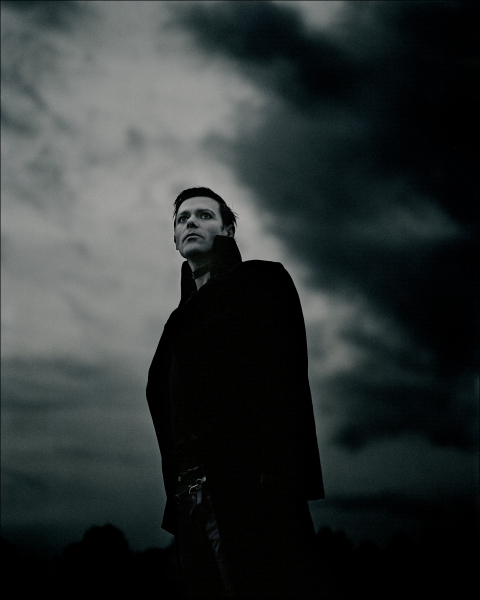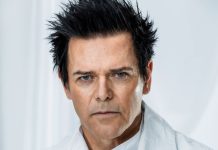 Here comes the translation of the interview from previous post. Translated by das kamikaze-zopfgummi. Thank you very much!
Here comes the translation of the interview from previous post. Translated by das kamikaze-zopfgummi. Thank you very much!
FRAGE: “žMr. Kruspe, you are known as the guitarist of RAMMSTEIN. Recently you have often found positive words about the work of your friend and musical colleague EMIGRATE, who is publishing his new album with “Emigrate” at the moment. How long did you know each other?”
RICHARD Z. KRUSPE: “žActually we’ve known each other for a pretty long time because we come from the same neighbourhood. However, in the past we haven’t had too much contact. Someday he came to me directly because he had some ideas and wanted to know my opinion.”
FRAGE: “žEMIGRATE, how did your encounter with RICHARD Z. KRUSPE come off?”
EMIGRATE: “žRAMMSTEIN is a great band and I respect Richard as a guitarist and songwriter. I hoped that he could help me to put my own projects into action and so I came to him. He was very open and interested towards the things I do.”
FRAGE: “žYet when people see you together they are a little bit irritated…”
EMIGRATE: “žPeople often say we’d look alike. I don’t think so, anyhow. But we were often on the move together, I was like his shadow, that’s how Richard wanted things to be.”
RICHARD Z. KRUSPE: “žSome people might find him a little bit creepy at first sight. Often he just stands beside and looks at you darkly. Often you feel him before you see him, his energy, his restlessness. In course of time he turned up more and more often and we heard music and discussed very much. I found EMIGRATE interesting as a person and right away I noticed that he knows a lot about music.”
FRAGE: “žWhich musical mutualities do you have?”
RICHARD Z. KRUSPE: “žWe both like the rather dark music, the early years of Swans, Big Black, Ministry, but also classical rock bands such as Led Zeppelin, AC/DC or Black Sabbath have had influence on us.”
EMIGRATE: “žWe both like songwriters like Trent Reznor, Martin Gore or Jeff Buckley, a musician who has died very early.”
RICHARD Z. KRUSPE: “žI’m also interested in the melodic aspect pop music has, which you often don’t find in hard music. I try to connect both elements.””
EMIGRATE: “žWe agree in this point. That’s the special thing about RAMMSTEIN music: It is rough and at the same time very melodic.”
FRAGE: “žHow did your friendship grow? That all sounds very harmonic.”
RICHARD Z. KRUSPE: “žSometimes it was also exhausting to work with him. When a song or a gig seemed to have been a success, he yet came along with critics. I advised him then to try it out himself, to really make his own music.”
EMIGRATE: “žThings had built up after a while. I had the impression of having to change something in a radical way. I didn’t come along with me and with Berlin anymore, so I decided to move to New York.”
FRAGE: “žWhat was the beginning of your career like?”
RICHARD Z. KRUSPE: “žI have come in contact with music in various ways. In my hometown Schwerin I played in the first punk band that existed there. It was called DAS ELEGANTE CHAOS. I just stood there in the rehearsal room of the band one day and played along. I played very loudly, but the other band members liked it.”
FRAGE: “žYou also have a classical musical education…”
RICHARD Z. KRUSPE: “That’s true. I walked right into that conservatory and performed a song by UFO: “žDr. Dr. Please”. They were pretty surprised, but then they let me stay.”
EMIGRATE: “žActually I was never interested in playing other bands’ music. I tried quite a lot. Today I know: Music is the most important element that helps me to express myself. I think Richard understands me very well in that point.”
RICHARD Z. KRUSPE: “žWriting songs can also be a kind of therapy. I think that’s the case when it comes to you.”
EMIGRATE: “žWriting songs is actually my life; I get sick when I can’t make music every day. Silence is not my thing. I freak out when things become to cosy. Other people go on holidays. That’s O.K., but I can’t do that. On the other hand it’s the most beautiful thing to happen when you succeed in making a song. You feel as if you are freshly in love. And you want to experience this feeling over and over again.”
FRAGE: “žSomeday you decided to produce an album with your songs…”
EMIGRATE: “žIt was very important for me to produce this album. The rest of the world didn’t matter to me, at first I did it for myself. That might sound strange, but it’s the truth.”
RICHARD Z. KRUSPE: “žI encouraged him to make this album. The intensity, or you could actually say: the obsession of his plans impressed me.”
FRAGE: “žMost of the time you live in different cities. What does that mean for your work?”
RICHARD Z. KRUSPE: “žPlaces, climate and people have a great influence on me. Certain music I can only write at certain places.”
FRAGE: “žEMIGRATE, you have actually dedicated a song to New York…”
EMIGRATE: “ž If it hadn’t been for New York, Emigrate, the album, it all would not exist. Maybe something different, but not EMIGRATE. The initial ignition has taken place in New York, so to say. New York inspires me, it has a magical effect on me. Berlin, on the contrary, often appears to me in a destructive and cold way.”
FRAGE: “žHow comes?”
EMIGRATE: “žI don’t know. Maybe it has got something to do with the many death people.”
FRAGE: “ž???”
EMIGRATE: “žAfter the end of the war many corpses were buried just in the same place where they had died since there wasn’t enough space at the cemetaries. Sometimes you can still feel their presence underneath the pavement. There is some kind of vibration, like a cold breeze in Berlin. Surely it also wasn’t by accident that Western Berlin became such a center of drug dealing back in the Eighties. In the Eastern part they had the alcohol. People wanted to escape from their reality, they wanted to forget, to daze themselves.”
FRAGE: “žSo your plans for moving from Berlin to New York had already been developing for a longer period?”
EMIGRATE: “žIn a way it was a spontaneous decision. At a certain point it had become clear for me that I had to go, that city is doing me no good. I left everything behind and turned over a new leaf.”
FRAGE: “žWhen did you move to New York?”
EMIGRATE: “žThat was in1999. When I arrived in New York I hardly knew anyone. But many places were strangely familiar to me right from the beginning. The same about the people. In Berlin Americans are sometimes said to be superficial. I would call them “open”. More open than many Germans. In Berlin I don’t feel lonely at home, but in the streets. In New York you never feel alone outside, but rather in your own home. That’s got something to do with the Americans’ frankness in public life. America always was the country of the brave who wanted to try something new, but also a country of the criminals. The city is determined by an unmoral pioneering spirit. There is always a kind of promise, every newcomer has got a chance.”
FRAGE: “žMr. Kruspe, how did you feel about your friend going to New York?”
RICHARD Z. KRUSPE: “žI felt excited. I wouldn’t have thought about that, however. Many of my friends live in Berlin. RAMMSTEIN is very much about Berlin and about the German language. I didn’t like New York at my first visit. But certainly New York is one of the most difficult and at the same time most beautiful cities in the world.”
FRAGE: “žWas it worth the step for EMIGRATE?”
RICHARD Z. KRUSPE: “žYeah, it is enviable: He hangs around in an old fire station in Manhattan writing his music! I visited him a few times ”
FRAGE: “žWhy is your project called EMIGRATE?”
EMIGRATE: “žMany generations of immigrants arrived at the harbour of New York, who had left their home countries to begin a new life in the city. For me, EMIGRATE has got something to do with both physical and mental emigration. I was also on the run for a while – I ran away from myself and from the “shadows of Berlin”. Thank God I came to New York. This town is both my asylum and my personal Babylon. It was the city who gave me the name EMIGRATE. It made me aware of what I want to do, how I want to live. It gave my life a focus, so to say. To me, New York funktioniert is like a filter, keeping everything unimportant away from me. It’s also full of drama and stories. I need that to be creative. In my house in New York, for example, I can feel a certain energy. That might sound strange, but you can feel the spirits of the past wandering trough the house.”
FRAGE: “žRAMMSTEIN works with German texts, wheras EMIGRATE writes in English…”
EMIGRATE: “žIt was just natural for me to use the English language. I even think in English when I’m in New York. I didn’t try out, but I don’t think I would be able to write German texts in New York. I pretty much feel at home in the English tongue.”
RICHARD Z. KRUSPE: “žGerman is a sonorous, grave language with many nuances. My mother tongue. Actually I grew up with American music. There are my roots, but after my first visit in America it became clear to me that I have to do something that is connected to the German language, the German culture. Then we founded RAMMSTEIN. RAMMSTEIN could never have been created in America, in New York.”
FRAGE: “žEMIGRATE, your first album is a very personal one. Was it difficult to express your feelings in words?”
EMIGRATE: “žNo. So much has happened within my first time in New York, I had to deal with it somehow. In the beginning I didn’t know where the voyage will end.”
FRAGE: “žDo you know it now?”
EMIGRATE: “žI still believe in the old Chinese proverb: “The road is the goal”.”
FRAGE: “žDoes the fact that your friend RICHARD Z. KRUSPE has already made much experience with RAMMSTEIN help you with the development of the project EMIGRATE? Or, moreover: Does he give you advice from time to time?”
EMIGRATE: “žOf course he helps me sometimes, but the most important decisions I make myself. Richard built up the connection to Jakob Hellner, who has been the producer of RAMMSTEIN for many years and so he worked for “Emigrate” as co-producer.”
FRAGE: “žDidn’t this bring up the risk that there could result similarities to the sound of RAMMSTEIN?”
EMIGRATE: “žOf course Jakob and me watched out for that, especially in the beginning. But soon it became clear for me that we were about to create something of our own. During the whole period of production Jakob Hellner was a helpful partner and adviser whose opinion was important for us.”
FRAGE: “žEMIGRATE, who are the musicians with whom you recorded your first album? And will there follow a second one?”
EMIGRATE: “žThey are all good friends and musicians: Arnoud Giroux (Bass), Henka Johannson (Drums), Olsen Involtini (Guitar), Sascha Moser (Programming). It was a natural and organic cooperation, the guys who had never played together in this constellation got along really well. To the second part of the question: EMIGRATE is a long-term project. Right now, there are already ideas for a second album.”
FRAGE: “žYou sing yourself. Was this fact clear from the beginning?”
EMIGRATE: “žNo. I also looked for other singers. But then it turned out like this. My friend Arnoud Giroux made me realize it: You wrote these songs for yourself. You have to sing them. That’s the only way.”
FRAGE: “ž When you hear EMIGRATE’s music, you instantly think: This has to be performed live…Will you also perform with the musicians you recorded your album with?”
EMIGRATE: “žWe are thinking about it. In fact, it is a big attraction for me to play with EMIGRATE in front of an audience, but at the moment there are no tour plans. There are many busy musicians involved, who live and work in different countries. That was already a challenge during the recordings.”
FRAGE: “žWhich role do visual aspects play in your artistic work?”
RICHARD Z. KRUSPE: “žThey are very important to me. With RAMMSTEIN we’ve tried out quite a lot of things. For example I find it fascinating to play a role, to act another character. I’d love to try something like that if I had the chance. Sometimes I think that there is more than one person inside of me. Stories like “žDR. JEKYLL UND MR. HYDE” fascinate me very much.”
EMIGRATE: “žI have a passion for films and movies. I’m sure this will be visible in the performances of EMIGRATE somehow – no matter where they’ll take place.”
FRAGE: “žWhats the diffenence between EMIGRATE and a classic band?”
EMIGRATE: “žOn the one hand I’m free to decide how the project will develop, but on the other hand the frictions and the permanent creative input within a band like RAMMSTEIN are a very productive factor. I’ve often envied Richard because of this…”
FRAGE: “žWill the two of you once work together, produce an album or perform together? ”
EMIGRATE: “žI’d appreciate that very much, but at the moment it seems rather unrealistic. In the next months Richard has got enough to do with RAMMSTEIN.”
RICHARD Z. KRUSPE: “žSomeday – Why not? Who knows what will be!”
FRAGE: “žMr. Kruspe, could you tell us something about the closer future of RAMMSTEIN?”
RICHARD Z. KRUSPE: “žWithout revealing too much: We are working intensively. RAMMSTEIN is a unique project. Authentic, uncompromising to the outside and to the inside. Sometimes RAMMSTEIN-fans worry about the band’s future. But I can assure them: RAMMSTEIN will go on for sure. There will happen quite a lot in the next time.”
FRAGE: “žWe are looking forward to that. Mr. Kruspe, Mr. EMIGRATE, thank you very much for the interview.”
Source: www.motormusic.de










i love rammstein there music made me come over anything tragic i came to life with i’m in love with richard kruspe and always will be i love the band they always gave me a postive out look and i wish they would come to the untied states of america